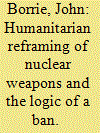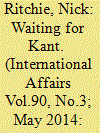| Srl | Item |
| 1 |
ID:
131442


|
|
|
|
|
| Publication |
2014.
|
| Summary/Abstract |
The achievement of past international treaties prohibiting anti-personnel mines and cluster munitions showed that unpropitious political situations for dealing with the effects of problematic weapons could be transformed into concrete, legally binding actions through humanitarian-inspired initiatives. Although there is now renewed concern about the humanitarian consequences of nuclear weapons, some policy makers dispute the relevance of these past processes. This article examines how and why cluster munitions became widely reframed as unacceptable weapons, and the nature and significance of functional similarities with contemporary efforts of civil society activists to instigate humanitarian reframing of nuclear weapons and promote the logic of a ban treaty in view of its norm-setting value among states. In the case of cluster munitions, the weapon in question was signified as unacceptable in moral and humanitarian law terms because of its pattern of harm to civilians with reference to demonstrable evidence of the consequences of use. Ideational reframing was instigated by civil society actors, and introduced doubts into the minds of some policy-makers about weapons they had previously considered as unproblematic. This is relevant to the current discourse on managing and eliminating nuclear weapons in the Nuclear Non-Proliferation Treaty, in which there is dissonance between the rhetoric of those states claiming to be responsible humanitarian powers and their continued dependence on nuclear weapons despite questions about the utility or acceptability of these arms.
|
|
|
|
|
|
|
|
|
|
|
|
|
|
|
|
| 2 |
ID:
115576


|
|
|
| 3 |
ID:
131441


|
|
|
|
|
| Publication |
2014.
|
| Summary/Abstract |
Expectations of significant progress towards a nuclear weapons-free world continue to shape global nuclear politics. Progress towards nuclear disarmament will require diminishing the value of nuclear weapons to the point where it becomes politically, strategically and socially acceptable for nuclear-armed states to relinquish permanently their nuclear arsenals. Key to this are the concepts and processes of 'devaluing' and 'delegitimizing' nuclear weapons that have steadily coalesced in global nuclear discourse since the mid-1990s. This article builds on current research by developing three images of nuclear disarmament under the Nuclear Non-Proliferation Treaty (NPT): 'surface' devaluing, 'deep' devaluing, and delegitimizing nuclear weapons. The first represents codification by the nuclear-weapon states of the transformation of the Cold War environment through reductions in the size and role of nuclear arsenals that leaves the logic of nuclear deterrence and nuclear prestige largely unchanged. Deep devaluing is framed as a reconceptualization of the political, strategic and military logics that underpin nuclear-weapons policies and practices. Delegitimizing represents a more radical normative project to transform collective meanings assigned to nuclear weapons. The analysis examines conceptions of devaluing nuclear weapons from the perspective of non-nuclear weapon states and the relationship between devaluing nuclear weapons and the idea of a spectrum of nuclear deterrence. It concludes by highlighting the tension between surface and deep devaluing, the emergence of a delegitimizing agenda, and the political implications for the current NPT review cycle set to culminate in the next quinquennial Review Conference in 2015.
|
|
|
|
|
|
|
|
|
|
|
|
|
|
|
|